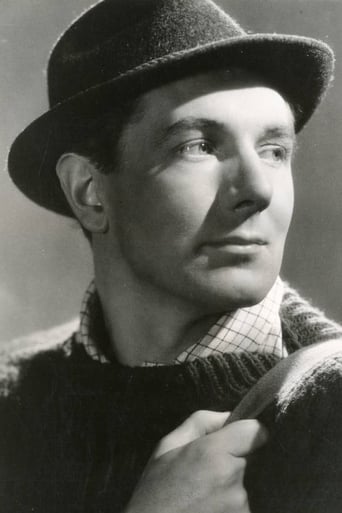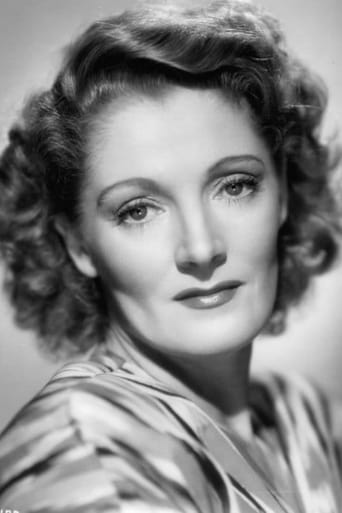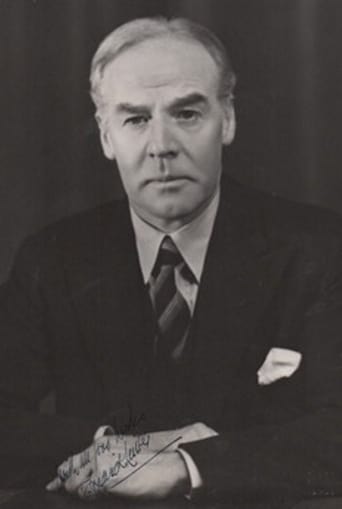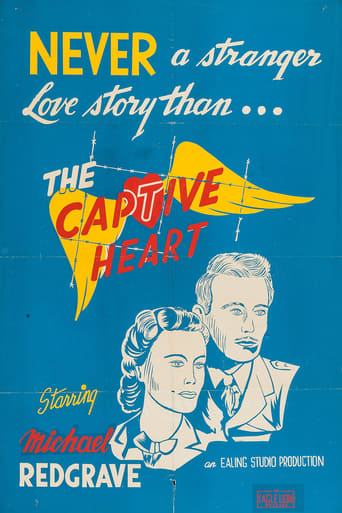
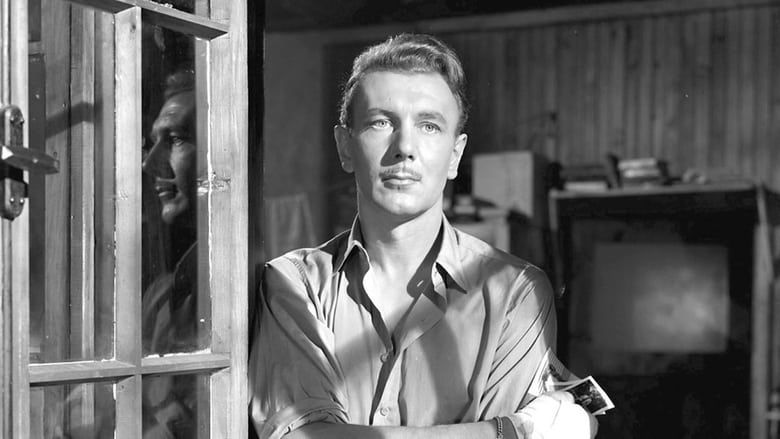
The Captive Heart (1946)
A series of stories about the lives and loves of nine men in a Prisoner of War Camp over five years. Location shooting in the British occupied part of Germany adds believability. The main story is of Hasek (Redgrave) a Czech soldier who needs to keep his identity a secret from the Nazis, to do this he poses as a dead English Officer and corresponds with the man's wife. Upon liberation they meet and decide to continue their lives together. The other inmates' stories are revealed episodically.
Watch Trailer
Cast


Reviews
(53%) A very simplistic prisoner of war drama from Ealing studios about a Czech man who changes his identity to that of a British captured soldier to avoid being killed. This looks at the life of both the prisoners and their family back home giving a decent incite into the inner workings of wartime for the vast majority of normal people. The performances are largely standard stuff, with some touches of film noir to the again pretty standard direction. While the plot is predicable with very little in terms of surprises, but the fact that this was released only a few years after the war itself, and as everyone back then who watched this had actually lived through the misery of that page in time, so the makers didn't really attempt to over-aggrandise the events that directors now might feel more inclined. Overall this is so-so matinée stuff that I'd only recommend to big war movie buffs.
I was thrilled when the movie began. I had no idea it was made by Ealing Studios, but I always felt impressed by their every film. They just seemed to make the most out of even the simplest stories.This film is about a group of British soldiers spending the war in a prisoner of war camp. "The Captive Heart" stretches from 1940 through the war to the return of the prisoners to their homes.Often, the story is punctuated with flashback scenes--showing the soldiers in mostly happier days with loved ones. In addition to the many little vignettes is an odd (and rather difficult to believe) story involving Michael Redgrave. It seems he's a Czech who's escaped from a concentration camp and is re-captured by the Germans. However, not wanting to be returned to a hellish place like Dachau, he assumes the identity of a dead British soldier--and is sent to the camp along with the real British prisoners. This story and how it all plays out is very interesting. I don't want to say more, as it would spoil the story.The film has very nice acting and a reasonably engaging story. My only major complaint is that because the film takes place over such a long time period, the film is a bit episodic and shallow at times. But it's still a well made and engaging film from start to finish.
In Stalag 17 there's a famous scene and line where the audience who now knows that Peter Graves is an agent is pitching horseshoes and trying to obtain information, as he lands one, an off screen voice says 'that's a ringer.'The British prisoners, mostly from Dunkirk, who because of capture sat out the war have a ringer among them in The Captive Heart. It's Michael Redgrave, but his is not an espionage mission. He's a Czech who's escaped from a concentration camp and found himself on the battlefield where the defenseless British have surrendered. He takes the identity and uniform of a dead officer and is then 'caught' by the Germans.To keep up the deception Redgrave writes letters back to his 'wife' in the United Kingdom, played by his real life wife Rachel Kempson. She and her real husband have not gotten along and truth be told his call up for war was greeted with some relief. But Redgrave wrote such poetical stuff she falls for him by correspondence.Although Redgrave's story is the main plot line, there are others that are nicely acted. Young Gordon Jackson goes blind because of lack of proper care for his wounds and he gives a touching performance. And chief officer of the prisoners, Basil Radford is an inspiring leader among them, trying to keep up morale as best he can.The Captive Heart is a tandem pulling of the strings on the auricle and ventricle of the viewer. It's a fine wartime romantic drama with equal accent on the war and the romance. It was done just as Michael Redgrave was reaching his heights as one of the United Kingdom's premier players. Try not to miss it if it is broadcast.
The prison camp is, in many ways, a metaphor for wartime Britain and its postwar hopes and aspirations. 'All sorts and conditions of men' are herded together in the camp, and despite the underlying tension, the boredom, and the self doubts, they must try and get along with each other. Indeed, it goes far deeper than that - they must try and look out for each other and protect each other.And so they encourage the blind lad in his efforts to learn brail and come to terms with his blindness. A young 'tearaway' (a pre-war thief)comes to realise that even he has something to contribute. As the others try and think up a way of protecting the identity of a Czech hiding amongst them, he confesses that he knows how to open a safe, and can break into the orderly office and destroy the incriminating evidence.There are little touches of humanity in terrible situations. The order is issued to manacle the prisoners as a reprisal for some Allied slight (this actually happened), and the elderly German reservist guard tries to indicate to the blind prisoner that he is only 'obeying orders' and doesn't want to do it. The invalid wife of a prisoner is told, back in England, that it is too risky to have her husbands baby, but she sacrifices herself in the hope that he will have a child to come home too. The blind lad tries to put off his girlfriend because he doesn't want to be a burden to her.Some people find the main plot line a little contrived, but it is fascinating to see two strangers fall in love through a pretence. And so wartime Britain entered the postwar world with all its hopes and fears. Sadly, with no visible common enemy to unite them, many of these hopes of a common caring humanity were not to be realised.


